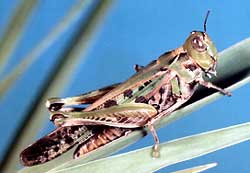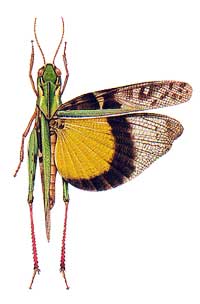
|
ACRIDIDAE Grasshoppers or Locusts |
|
| ||||||||||||
Female grasshoppers and locusts generally lay their eggs in a mass in the ground by extending their short ovipositors through the soil surface. On hatching the young resemble adult but are smaller and have no wings. Wings slowly develop over a series of moults.
The Australian plague locust is a native species of Australia and is one of the most economically important species in Australia. At times this species is known to build up in great numbers forming swarms that migrate across central and eastern Australia eating their way through almost anything green. This species can be recognised by the black patch on the tip of the hind wing and the red colouring on its hind leg. The body of female Australian plague locusts is usually green, but when swarming is brownish in colour.
Urnisa guttulosa is sometimes known as the salt and pepper grasshopper and its reddish colouring is a reflection of its preferred environment. This species is widespread across the arid to semiarid areas of the country and is usually found in sandy environments. This is an alert and quick-moving grasshopper that will take to the wing readily when disturbed.
For more grasshopper and locust species visit the Australian Insect Common Names - Acrididae section found here. |




